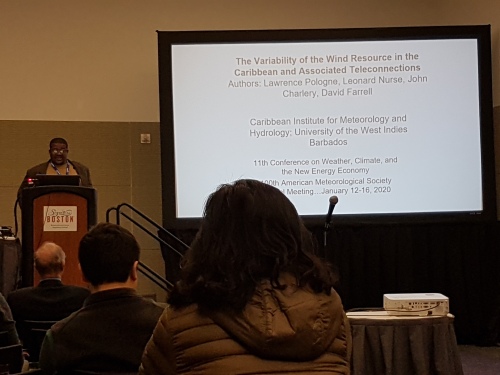The 100th Annual Meeting of the American Meteorological Society (AMS) was held in Boston, Massachusetts from 12 to 16 January 2020.The theme was “The AMS Past, Present and Future: Linking Information to Knowledge to Society (LINKS)”.
The AMS is an excellent forum for the exchange of the latest developments and research in the fields of weather, water and climate, including climate change. At the Presidential Forum, Gina McCarthy, the Administrator of the US Environmental Protection Agency (EPA) from 2013 to 2017 noted that although the US government had initiated the process to withdraw from the Paris Agreement, 25 States had committed to fulfill the government’s commitments in its NDC. She noted that these 25 States account for 55% of the nation’s greenhouse gas emissions and collectively are the 3rd largest economy in the world.
Professor Petteri Tallas, Secretary General of the World Meteorological Organization (WMO) spoke on the reforms underway at the WMO to support the delivery of services in a changing climate. WMO’s State of the Climate Report at COP 25 noted that concentrations of greenhouse gases in the atmosphere were now at an unprecedented level. The last five years and the last decade were the warmest ever recorded. As the world transitioned to a low carbon and climate smart development pathway, more support from the meteorological community would be required to support both adaptation and mitigation activities.
There were several sessions of relevance to the Caribbean. In When Can We Talk about the Successes? Perspectives on the Impacts of Hurricane Dorian to Buildings and Infrastructure in the Bahamas the presenter noted that while engineering surveys identified the reasons buildings failed, they could not show why adjacent buildings which were even more exposed survived. It was important to use these structures as examples to design and construct hurricane resistant buildings. Others presentations included Impacts of Climate Information on Coffee Forms in Jamaica, Future Climate Projections in the French West Indies: Regional Climate, Tropical Cyclones and Storm Waves, The Role of Convection on the Decreasing Caribbean Precipitation during a Regional, Warming Sea Surface Temperature Period: 1982-2017, and Interannual Variability of the Early and Late Rainy Seasons in the Caribbean.
Several members of the Caribbean Institute for Meteorology and Hydrology (CIMH) made oral and poster presentations: Shanice Whitehall, Monitoring the Saharan Air layer over the Caribbean using Satellite Imagery, Darlene Field, Using Aerosol Optical Depth to Enhance Prediction of Solar PV Performance in Tropical Climates: Case Study – Barbados, Ashford Reyes, The Predictability of Saharan Dust Incursions over the Eastern Caribbean, Branden Spooner, Development of Interactive Visual Environment for Hydrometeorological Visualization and Analysis, Theodore Allen, The Hurricane Heat Trail Effect on Caribbean Heat Waves, and Lawrence Pologne, The Variability of Wind Resource in the Caribbean. Arlene Laing, Coordinating Director of the Caribbean Meteorological Organization presented on Contributions of Women in the English-speaking Caribbean to Tropical Meteorology Operations, Education Research and Applications.
The Caribbean was well represented at the meeting. Dr David Farrell, Principal of the CIMH was present as well as Glendell de Souza of the CMO and the Directors of the Meteorological Services of the Bahamas, Belize, Guyana, Jamaica, and Suriname. Dr Leonard Nurse the former Chairman of the Caribbean Community Climate Change Centre and Carlos Fuller, the International a d Regional liaison officer at the Centre also attended.
The climate change community in the Caribbean should consider attending these annual AMS meetings. One of the conferences which comprise the meeting is the Conference on Climate Variability and Change. Several sessions were devoted to the media and weather presenters on conveying climate change information. Marshal Shepherd formerly of NASA and now at the University of Georgia presented on Attributing Extreme Weather Events to Climate Change. Another session was devoted to Climate Change Adaptation Strategies for Coastal Urban Tropical Environments where a presentation should have been made on Climate-Resilient Caribbean Cities: the Grenada Case. There were other sessions devoted to Greenhouse Gases. These sessions and presentations can expose Caribbean climate change policymakers, negotiators and implementers with the state of the science.





